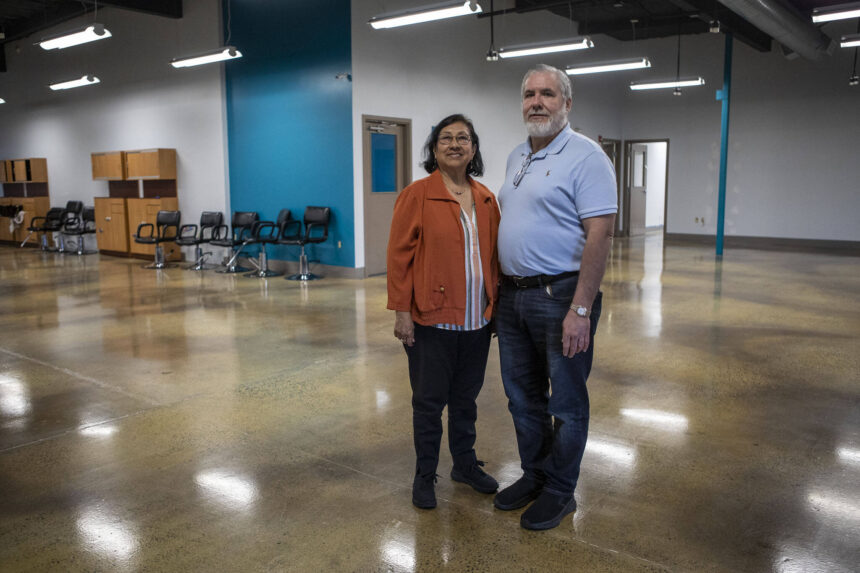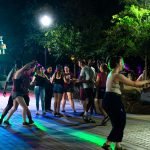EVERETT — Rosario Reyes keeps dreaming bigger and bigger.
After immigrating from Peru to Snohomish County in the 1980s, Reyes worked at local Latino nonprofits for several years. She observed Latinos struggling to navigate daily life in their new county, not to mention their educational and business goals.
In 1998, Reyes began a new venture with her experience, passion and a name: the Latino Educational Training Institute. She connected with North Seattle Community College to recruit immigrants for real estate training. That year, 19 students finished the program with their real estate license.
“The main problem is learning the language and learning how the system works,” she said. “And in many cases, business is the first way to empower them.”
Now, the need for education and business development is greater than ever: nearly 100,000 county residents identify as Hispanic or Latino, and 34,000 residents speak Spanish only, according to the U.S. Census. And as of this year, Washington residents can obtain professional licenses regardless of immigration status.
From small beginnings, Reyes has built a staple nonprofit for the Latino population in Snohomish County. She’s now working with Edmonds College to develop a Latino cultural, business and education center in Everett.
“Our dream is mobilizing families to get out of minimum wage jobs,” Reyes said, “and into something that offers better possibilities for them and for their families.”
Improve their lives, improve their earnings
For the first decade, Reyes and a handful of volunteers helped first and second-generation Latinos understand government systems, get their education and start a business. In 2008, Reyes filed for a nonprofit status, and four years later the institute had its first contract with Edmonds College for a Spanish GED program.
Reyes also launched the Latino Leadership Initiative, a college-based program focused on empowering Latino youth to become community leaders. To date, 246 students have graduated from the program.
“That was how I first fell in love with community work,” said Marisol Bejarano, now the institute’s health and wellness director. “I learned a lot about other Latinos like me, with similar stories and backgrounds, and that set me on my path.”
In 2012, the nonprofit had one part-time admin and was pulling in about $50,000 a year in donations. Tom Laing, a volunteer with more than 20 years of corporate accounting and management experience, began writing grants.
“One of the things I know I can do for the community to help them improve their lives,” said Laing, now the director of operations, “is to improve their earnings.”
When the pandemic hit, Reyes and Laing were suddenly knee-deep in money for COVID-19 response, including food distribution, Spanish health education and outreach. The institute transitioned to virtual education, making class attendance easier for students with jobs or kids. Soon, classes filled up, and students were begging for more spots.
“The thing that came into the back of our minds is, what are we going to do when covid is over?” Laing said. “We’ve got to figure out how to make this sustainable, because there’s definitely a need.”
Better possibilities
In 2022, the institute had 24,000 client encounters across its 26 programs. That number jumped to 54,000 in 2023. The institute now has 22 paid staff members, and a budget of more than $1.2 million.
In other words, it’s outgrown its 70-year-old, 1,800-square-foot office in Lynnwood.
“Face it, I got a fair amount of gray hair,” Laing said. “Rosario is talking about things from 40 years ago. We’re going to ensure that this asset lives on for the community.”
Earlier this year, Reyes saw the former Paroba College of Cosmetology building at 9930 Evergreen Way for sale. One of the sellers knew Reyes’ work, so she agreed to hold the 15,750-square-foot building until Reyes could get the money.
“We met with 20-plus legislators and explained what our dream was,” Reyes said.
In the new space, the institute would host a vocational school for bilingual office and bookkeeping training; language classes; bilingual Labor and Industry training; cooking classes for food truck or catering licenses; and an after-school program to help Latinos finish high school and join apprenticeships.
The space would moonlight as a cultural event center to be rented out for theater, quinceañeras and weddings. In addition, a commercial kitchen, on-site food truck and specialty store would serve as both a training space and source of revenue.
“It’s not only talking about it,” Reyes said, “but demonstrating that it can be done.”
The institute would use the truck to show trainees how to start a food business from the ground up. Meanwhile, established food truck owners and caterers could rent the kitchen space for prep. At the store, caterers could sell their product. Their traditional dishes, such as enchiladas, empanadas and tamales, would also be available for delivery, Reyes said.
Students could use the institute’s “child care circles” model, Reyes said, where mothers take turns watching children, while others work or attend classes.
Long-term sustainability
State legislators agreed to allocate $3.8 million for the new project, called the Incubator for Family Success, in this year’s capital budget. State Rep. Rick Larsen, of Everett, then requested another $3.8 million for the project out of next year’s spending.
“I have long admired the work Rosario Reyes and the Latino Educational Training Institute have done on behalf of Latino immigrants in Northwest Washington,” Larsen said in a statement. “The (new) project creates a safe and welcoming space for immigrants and their families to connect to vital services, learn critical skills and access jobs and opportunities.”
In addition, the Initai Foundation granted $200,000 for renovations and $100,000 to launch a capital campaign in support of the project.
Reyes hopes to seal the deal by the end of August, and open the new building in 2026. In the meantime, she’ll work on partnerships with the Mukilteo and Everett school districts. Latinos make up 20% to 29% of students in Edmonds, Everett and Mukilteo schools.
”If we don’t work together, there’s very little hope,” she said.
So far, the institute’s programs have been grant-funded. If all goes to plan, the institute would bring in about $5 million per year and have long-term sustainability, Laing said.
Sydney Jackson: 425-339-3430; sydney.jackson@heraldnet.com; Twitter: @_sydneyajackson.
Gallery











